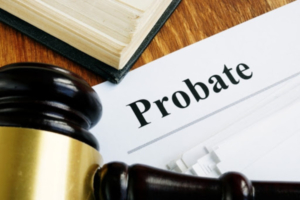
What Is Probate?
Probate is a legal process that results in the executor of an estate distributing the decedent’s assets to their heirs and the beneficiaries listed in their will. While this boiled-down version of the probate process makes it seem simple, in practice, probate is often complex.
First, a judge verifies a person’s death and determines whether their will is valid. Next, the judge appoints an executor to oversee the administration of the estate. The executor is responsible for identifying and locating all estate assets, accounting for and paying the estate’s debts, and paying any federal estate taxes owed. An executor is also responsible for defending the estate in the event that someone challenges the validity of the decedent’s will.
Given all the steps involved, the probate process can take months—or even longer in some cases. Unfortunately, this can significantly increase the amount of time beneficiaries and heirs must wait to receive their inheritance. However, an estate planning legal team can help individuals and families identify ways to reduce the amount of probate assets in their estate.
Understanding How to Avoid Probate
While probate might not be entirely avoidable, there are steps to take that can minimize the total number of assets that must pass through probate. Below are some of the most common probate avoidance strategies. However, keep in mind that no single strategy works for everyone. The assistance of an experienced Florida estate planning lawyer will help ensure that any probate avoidance strategies have their intended effect.
Retitling Assets in Another’s Name
One of the easiest ways to avoid probate is to transfer ownership of an asset into another’s name. For example, you may decide to convey a piece of real estate to a child or grandchild, effectively removing it from your estate. However, retitling assets comes with some risks. For example, if you conveyed real estate to an adult child, you would lose control of the property. Potentially even worse, the property would become subject to the new owner’s creditors.
Listing Beneficiary Designations on Qualifying Accounts
Another easy way to reclassify probate assets into non-probate assets is to add beneficiary designations on all qualifying accounts. Funds in a bank or brokerage account with a listed beneficiary or a “payable on death” (POD) designation automatically transfer to the listed individual. However, it is imperative that you remember to review your beneficiary and POD designations whenever your circumstances change.
Creating a Revocable Living Trust
A revocable living trust is a trust created during the lifetime of the grantor. Often, grantors will name themselves as the trustee. This way, they maintain control over the assets in the trust during their lifetime. Generally, a grantor should also name a successor trustee to take over the role when the original trustee dies or can no longer administer the trust. Revocable living trusts are a good way to convert probate assets into non-probate assets because they reduce the value of your estate while allowing you to exercise control over the assets during your life.
Purchasing a Life Insurance Policy
Proceeds from a life insurance policy do not need to go through the probate process because they pass directly to the beneficiary. By using estate assets to pay for the premiums of a life insurance policy, you can effectively reduce the value of your estate.
Reducing the Value of an Estate May Avoid Probate Entirely
Summary Administration
Entirely avoiding probate may not be a viable option for everyone. However, many people want to reduce the value of their estate to the point where it qualifies for simplified probate proceedings—or summary administration. In Florida, estates are eligible for the summary administration if one of the two situations apply:
- The value of the estate, less the value of all exempt property, does not exceed $75,000; or
- The decedent has been dead for more than two years.
Thus, by implementing a combination of the probate avoidance strategies listed above, it may be possible to bring the value of your estate low enough to qualify for summary administration.
Disposition Without Administration
Additionally, executors may also be able to administer a will without probate if two criteria are met. The estate must not contain real estate, and all property in the estate must be exempt from creditor claims—except for the amounts needed to cover the final two months of medical expenses. This is referred to as disposition without administration. When an estate qualifies for disposition without administration, the assets will transfer directly to beneficiaries. This will avoid probate entirely.
An experienced estate planning and probate lawyer can assist families in understanding which probate avoidance strategies make the most sense in their situation. While it may be tempting to try and devise a plan on your own, doing so risks jeopardizing the effectiveness of your estate plan.
Speak with an Experienced Estate Planning and Probate Lawyer Today
If you are considering beginning the estate planning process and want to learn why and how to avoid probate in Florida, reach out to Beller Law, PL for immediate assistance. Our Florida estate planning attorney has more than 25 years of experience helping individuals and families through the complex—and often stressful—probate process. We also create and implement sound estate planning strategies for those seeking to minimize the amount of assets that must pass through probate. To learn more and to schedule an initial consultation with our estate planning attorney in Jacksonville, FL, give us a call. You can also reach us through our online form, and one of our team members will contact you soon.
